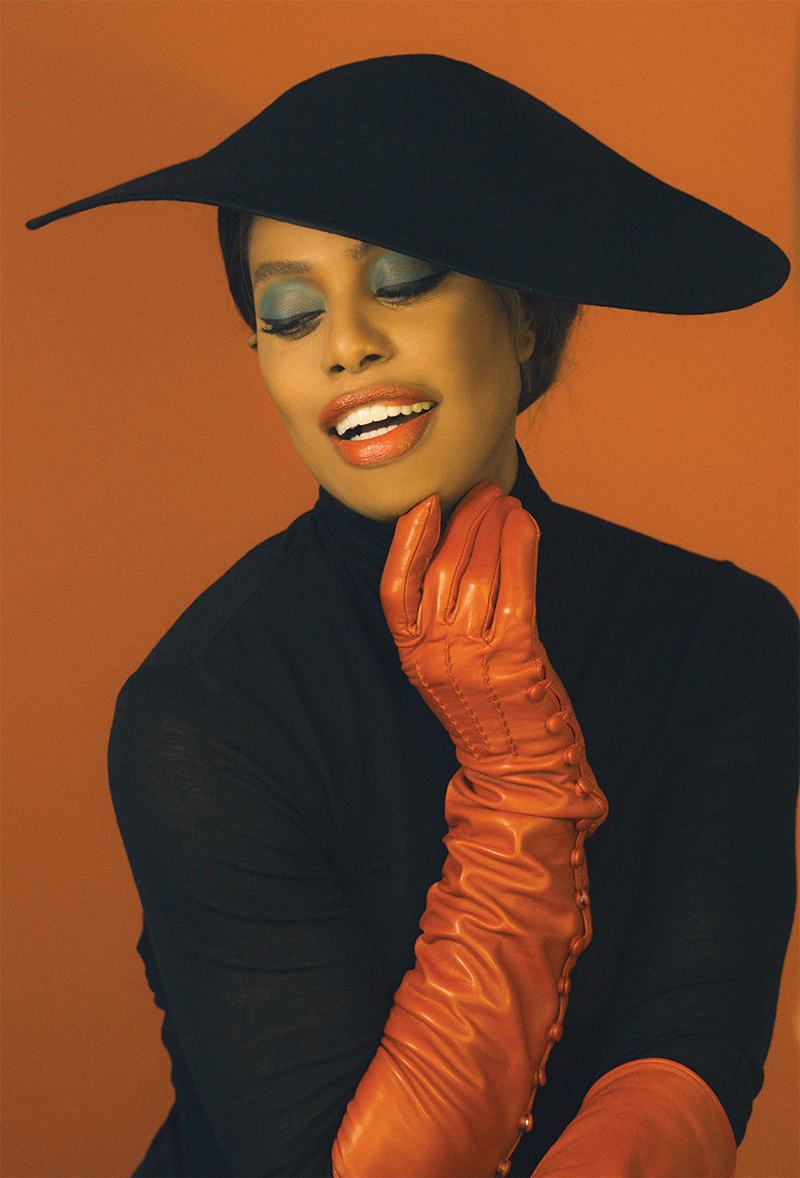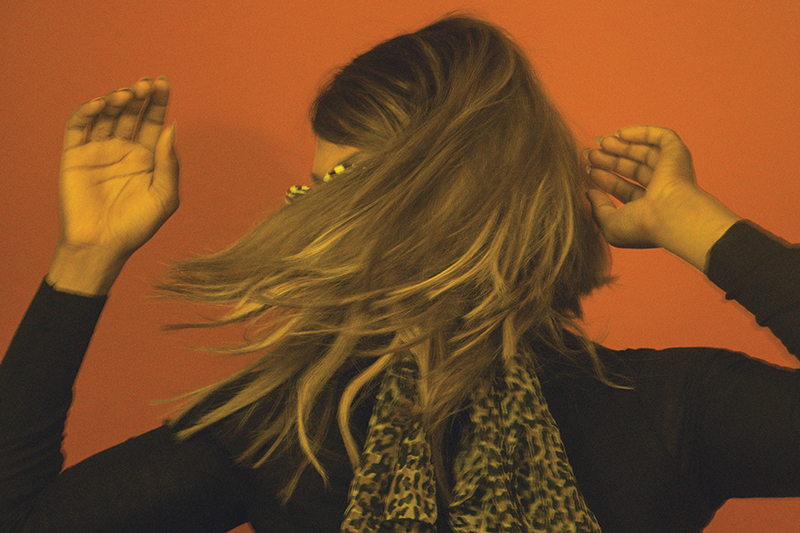
photos / Janell Shirtcliff
styling / JAK @ Atelier Management
makeup / Deja Smith for DD-Pro
hair / Neeko @Tracey Mattingly
nails / Chelsea King @ Celestine Agency
styling assistant / Xochi Barajas
story/ Koko Ntuen
production/ Erica Russell & Koko Ntuen
shot @ THE DREAM FACTORY LA
Powerhouse activist and superstar Laverne Cox is stuck in traffic when I catch her on the phone. She is airport-bound for the cross-continental leg from Los Angeles to New York. Like most of Hollywood’s elite, she is accustomed to this flight. At the time, Cox is in production for the fifth season of groundbreaking Netflix series Orange Is The New Black and the CBS legal drama Doubt. She has also just wrapped her role in the much anticipated Rocky Horror Picture Show reprise, in which she stars as Dr. Frank-N-Furter. Between that, her schedule is jam-packed with appearances, talk show interviews, fundraisers, award shows, and all the other work obligations that come with being an A-lister.
These days, you can’t escape her bombshell, wide-toothed smile. At this point, Laverne is a bonafide cultural icon. Her talks about gender rights have opened up conversations on a global level. Her 2015 Time magazine cover billed her as “America’s Next Civil Rights Frontier” in its cover story, “The Transgender Tipping Point.” She has won accolades and praise for her acting and advocacies in the media: 2016’s Screen Actors Guild Award for Outstanding Performance by an Ensemble in a Comedy Series, Time’s 100 Most Influential People, People’s World’s Most Beautiful Women List 2015, GLAAD Media Stephen F. Kolzak Award, 2014’s Glamour’s Woman of year, and Winner of a Daytime Emmy Award for her for Laverne Cox Presents: The T Word. She has written for the Huffington Post, been profiled by The New York Times, Cosmopolitan, and Vogue, and she has proven herself to be an intelligent and informative media mainstay.
I grew up in the ‘90s, where entertainment and rhetoric were segregated, and opportunities for women of color on film were limited. It was a frustrating time for me as a child, trying to consume media and seeing so many stories dependent on ordained narratives. I became a critic at an early age, but also remained hopeful that the valiant efforts of the many actors, directors, producers and filmmakers of color would perhaps break these media chains. Well, the chains are indeed breaking, and Laverne Cox is a big part of this movement.
“That’s a lot of work, to just show up and fully be yourself,” she says. “There’re so many forces out there. It’s just the shame that I’ve internalized, the shame of what bell hooks calls ‘the imperialist, white supremacist, capitalist, patriarchy.’ Personal shame and then the systemic stuff that wants to keep people from being themselves—the callback culture that we exist in online. It’s not easy. It’s diligent work to say, I’m gonna show up and bring all of myself and not live in shame and be in a place where I really strive to love myself better today. That’s work. That doesn’t just happen.”
Laverne has risen like a phoenix out of the ashes at a time where things could have seemed impossible. As a black woman, she is among the ranks of Beyonce, Serena, and Rihanna, when it comes to deserving single-name monikers. Watching her is a powerful experience. She demands respect and autonomy and is quick to navigate away from any damaging interrogations or dissections of her body. She does this in a gracious, lively, informative, and humble way that has left her with many fans, and she’s getting offered roles that not only create visibility in Hollywood, but are a remarkable shift away from archaic templates.
“Face it, I’m a black transgender woman,” she states, matter-of-factly. “It’s not like there were all these parts. There was no space that existed for me before I created it. There were people like Candis Cayne and Alexandra Billings and Aleshia Brevard, out trans actresses who came before me. But I had to blaze my own path based on their influence. I just did a photoshoot for Cosmopolitan where I got to pay a tribute to some of my possibility models and super heroines. They were all black women: trailblazing, black women artists who have sort of been a blueprint for me throughout my career.
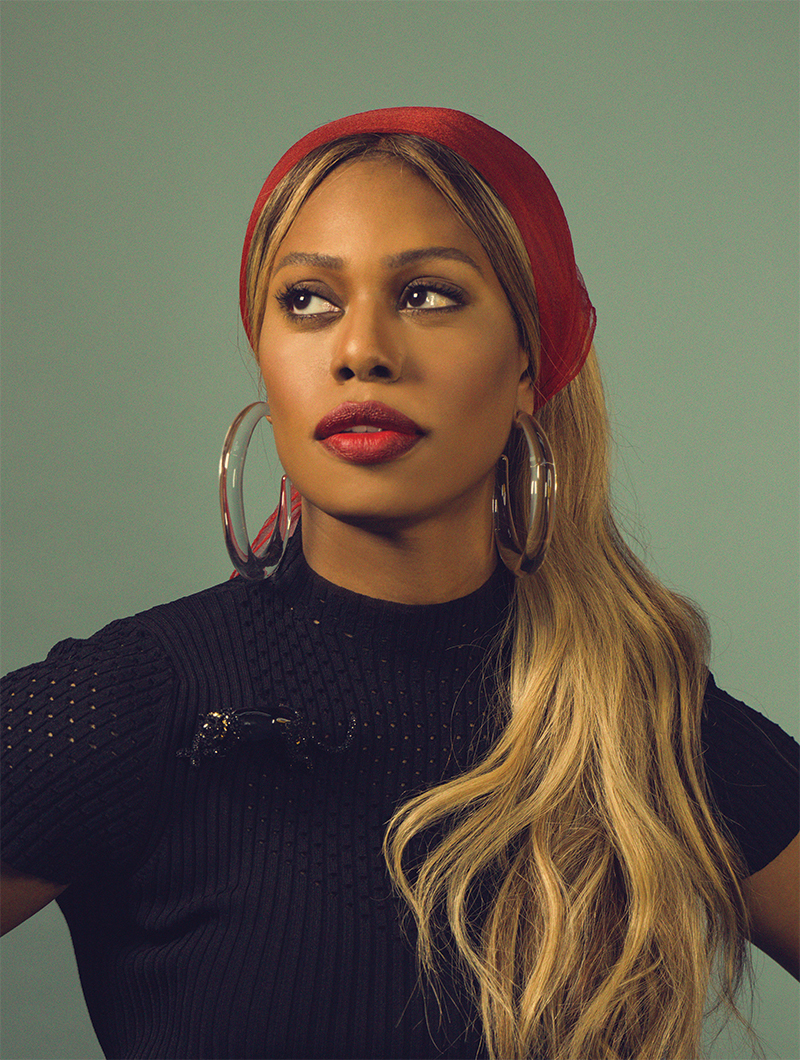 Top, Maje. Jaguar broach and hoop earrings, Alexis Bittar. Red headscarf, Stylist’s own.
Top, Maje. Jaguar broach and hoop earrings, Alexis Bittar. Red headscarf, Stylist’s own.
“I’ve blazed my own trail in a way,” Laverne continues, “but there have been other people who have come before me who helped out a lot in terms of me figuring out how to be an artist, but also how to be politically engaged and how to balance that. That’s still a struggle for me. There are a lot of issues that are important to me that I want to talk about. The LGBT Data Inclusion Act, for example, is something I have been talking a lot about, which would require federal governmental agencies to ask gender identity and sexual orientation questions so we can start to begin to gather better data about LGBT Americans…Violence against trans women is something I speak out a lot about. A young girl, who was in the Laverne Cox Presents the T Word, Daniella Carter, recently posted on her social media that she was attacked by three men in Las Vegas. This is a young girl who has already talked publicly about experiencing a lot of violence, the foster care system, and being homeless and she’s still dealing with violence as a trans woman of color. Our lives are so often in danger simply for being who we are as transgender folks. That’s something I want to talk about—and it’s important for me to talk about.”
At the same time, she says, she is an artist: “The reason people are listening to me is because I was so blessed to be on a popular and incredible show called Orange is the New Black. Finding the balance is something I look to other groundbreaking artists to guide me.”
It’s a lot. How does she balance the juxtaposition of it all? “It’s a tough terrain because there is a business,” she tells me. “We’re prepping for the Emmys now, so doing these award shows and award season and stuff—people dress you and they want shout outs and they should get them. There’s a whole business around that. But then it’s also the sense of we are more than our bodies or who we are wearing. This is what bell hooks calls the imperialist, capitalist, white supremacist patriarchy. The way that capitalism functions and makes changes—it really changes everything. It’s something to be really critical of, even though I’m very much a part of the system now, and so many of us are living in contradictions.”
Netflix, as she tells me, is one of those contradictory systems. “I would be delusional if I didn’t think I was a cog in the system. Netflix is incredible and groundbreaking [and has] has revolutionized television. I don’t think my rise would be possible if it weren’t for a revolution in the way people watch television and the revolution of Netflix. At the same time, Netflix is in every country all over the world…. I feel blessed and grateful that I do what I do. I’m working within the system…. Both things can exist at the same time. Someone can be revolutionary and inside the system at the same time. My brother would argue that I’m revolutionary in some ways and not in others.”
As a natural performer, Laverne has perfected an excellent craft with her body and is known for her no-holds-barred dance performances at parties and on her social media. While filming the first season of OITNB, she famously moonlighted at New York City’s drag cabaret bar, Lucky Cheng’s. Dancing is fun, but is also a skill Laverne approached like studying science.
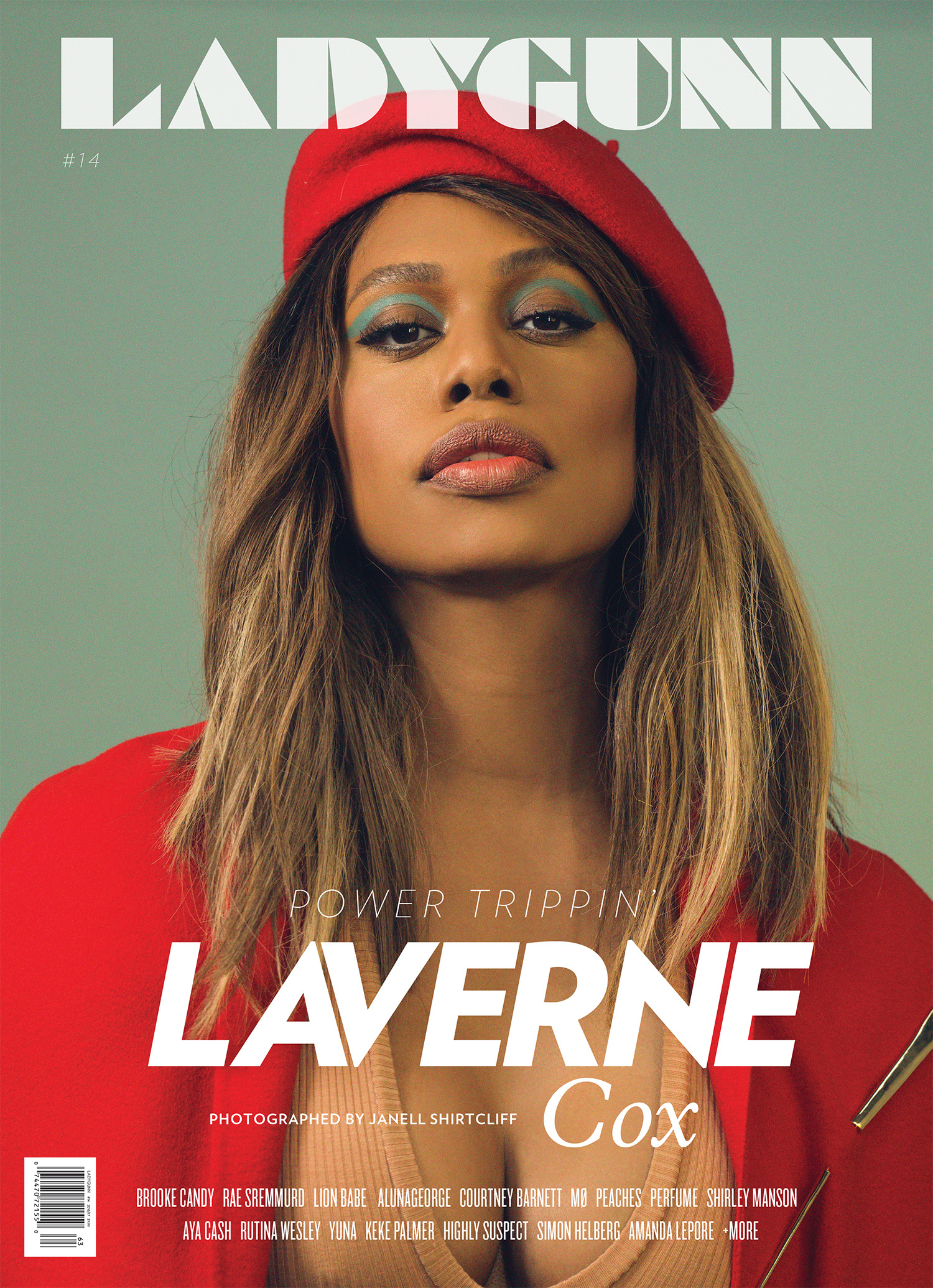 Coat, Maje. Bodysuit, Reformation. Gold pin, Alexis Bittar. Red beret, Stylist’s own.
Coat, Maje. Bodysuit, Reformation. Gold pin, Alexis Bittar. Red beret, Stylist’s own.
“I danced as early as I can remember,” she reveals. “I would dance around everywhere. I would always have music in my head. I always wanted to dance and begged my mother to put me into dance classes. Finally, in the third grade, I started studying dance. So I have been performing my whole life: getting up in church and making speeches, doing talent shows all over Alabama and the Southeast, And then as a dance major in high school at the Alabama School of Fine Arts. Then, as a dance major in college. I started acting in college and doing musicals and plays. It’s been my whole life…”
“Training has been really important,” the actress adds. “Talent is cultivated. You don’t have to deal with the process of trying to cultivate that talent. A lot of people have natural ability and natural talent. I think for me, it’s been very necessary to cultivate that talent.”
When I watch Laverne on TV or doing press, her rhetoric always seems to navigate towards broader issues. The way she shifts the conversation from vapid and superficial to conscious and political breaks the wall of the traditional commercial media narrative. At a time where she could easily float by on her beauty and success, Laverne uses her celebrity to change the word. Her famous Katie Couric interview turned the mainstream media on its head when Laverne all but schooled the seasoned media anchor about how to speak in about transgender politics in a safe and respectful way.
Laverne laughs when I bring this up. “My friend Tiq Milan, who used to work at GLAAD, does media training. He often uses my Katie Couric interview as an example on how to pivot, which is kind of cool….I think there’s a lot of things that need to change in the world and I’m speaking from my heart,” she explains. “But I’m also trying to speak from an informed place that’s empirical in terms of my own personal experiences and other trans folks I know and women I know and people of color that I know. And then policy, and trying to marry that with some kind of public policy.”
“The fight in being in entertainment is two-fold,” she continues. “So much of what I do in media is about changing hearts and mind. But we also need our policymakers and our politicians, and our judges and what happens in the courts is so crucial and so important.”
That said, Laverne reveals that this election cycle, she’s with Her: “That’s another reason why I’m supporting Hillary Clinton. The Supreme Court and the federal judges we appoint are going to be so crucial in deciding these issues. A woman’s right to choose, voting rights, trans rights, protecting LGBT rights, maybe overturning Citizens United so we can get some campaign finance reform so we can have better democracy… all these things are really crucial issues that we have to come out and vote for. We have to vote.”
Together, we reminisce for a moment about Barack Obama. “We have been blessed to have him in the White House,” Laverne gushes. “I have so much love and affection and adoration for the Obama administration. And, of course, his lovely wife and family. I just adore the Obamas.”
Using her celebrity platform, Laverne hopes to educate and inform her fans, her followers, and perhaps even her detractors, while remaining an entertainment fixture. It’s a powerful position to be in, one which is well-deserved.
“I feel blessed that I have been able to bring all of me to the work that I do in the media. I think for a while I thought that if I wanted to be mainstream I needed to dumb myself down,” she admits. “It’s really exciting that I don’t have to do that. I don’t think anyone should ever do that, actually. I’ve learned that I can show up and be me. I love pop culture…but I also am an intersectional feminist who is politically engaged. Being able to bring those things as well has been really empowering for me. I think that’s where my power lies right now.”
Soon, Laverne arrives at the airport and her publicist jumps in to say our time is over. I jumble a few words together: I tell her thank you for being you, I tell her I’m rooting her for her, I tell her I wish we were related—I might have even have told her I love her. And as we hang up, I image her hair billowing in the wind as she steps onto the tarmac. Her plane takes off and she’s gone, off to change the world.
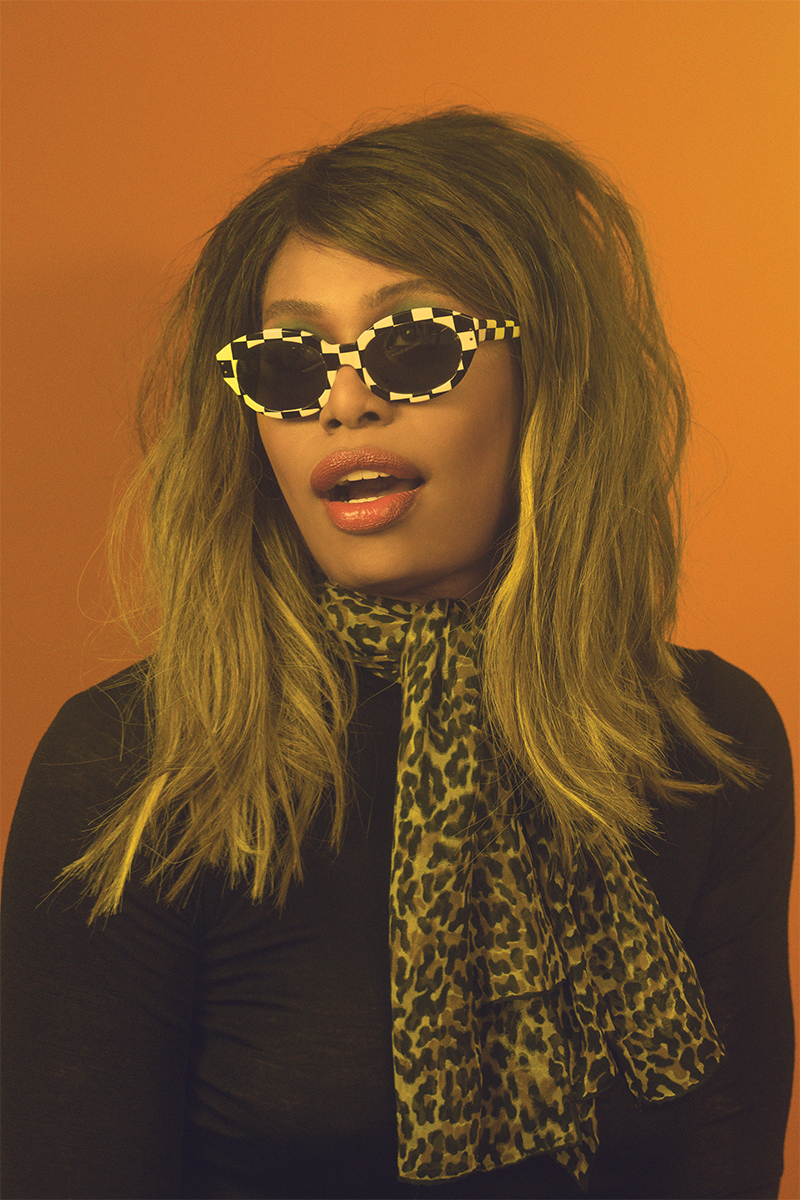 Turtleneck, Theory. Scarf, Stylist’s own. Sunglasses, Vintage (available at Hotel De Ville Eyewear).
Turtleneck, Theory. Scarf, Stylist’s own. Sunglasses, Vintage (available at Hotel De Ville Eyewear).
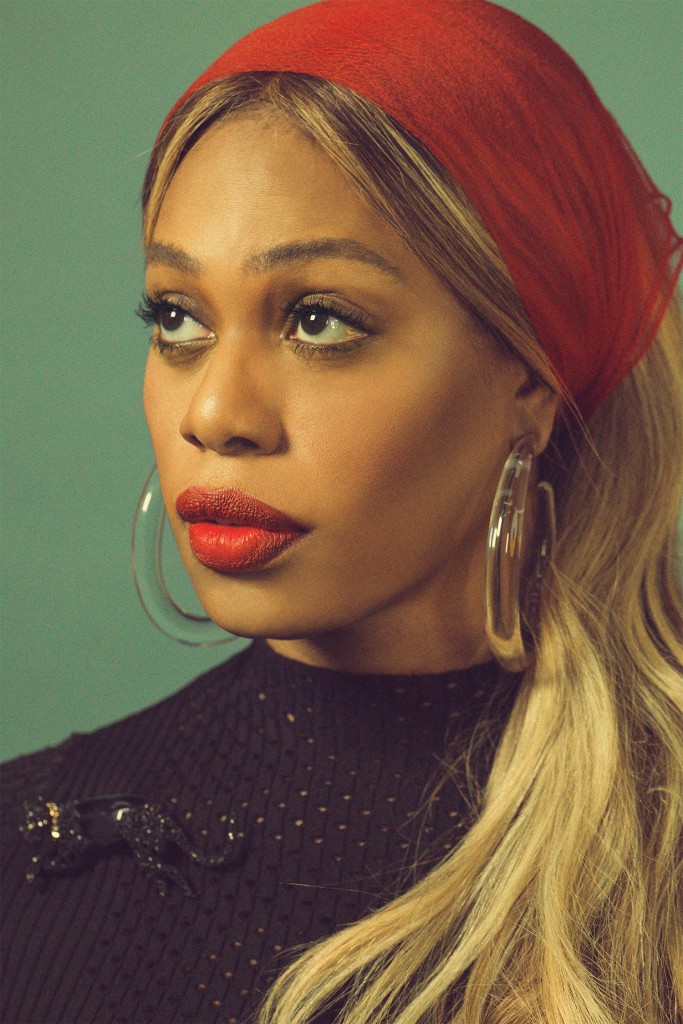 SEE MORE OF LAVERNE IN LADYGUNN’S #14 POWER TRIPPIN’ ISSUE !
SEE MORE OF LAVERNE IN LADYGUNN’S #14 POWER TRIPPIN’ ISSUE !

